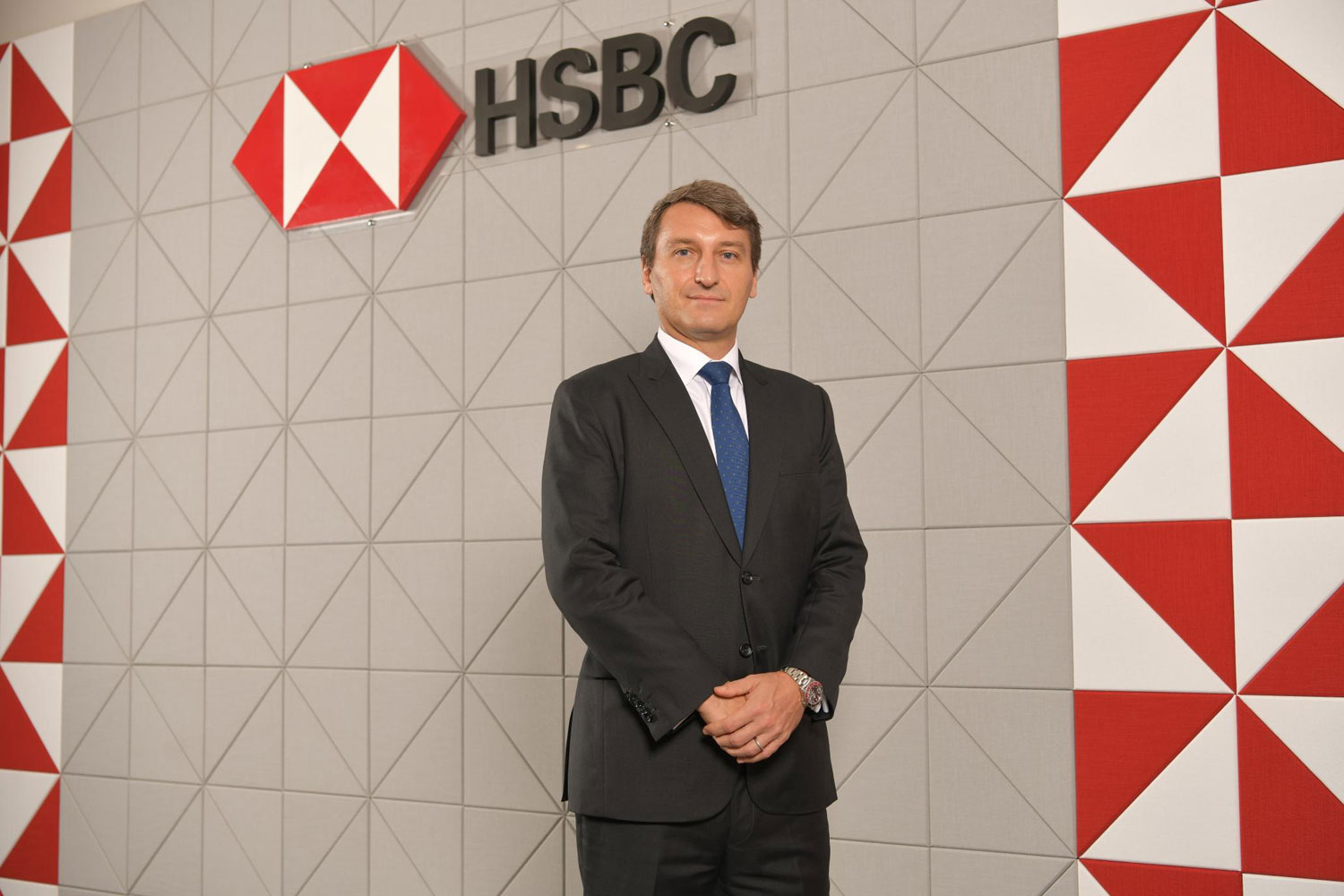
As the world reels, not just from the Covid-19 pandemic but the ongoing and fundamentally more serious crisis of global warming, deforestation and an over-reliance on fossil fuels in energy provision and manufacturing, HSBC has stepped up to the plate to reduce its own emissions by introducing new products and services that will support the sustainable transition.
To find out more about HSBC’s sustainability strategy, its activities in Thailand and how it is helping companies based within the Kingdom prepare for the future and become more responsible and sustainable, we spoke to the new CEO of HSBC Thailand, Giorgio Gamba.
Opening with praise for HSBC Thailand staff, Giorgio pointed out that it was because of their professionalism and dedication that HSBC is recognised as the international bank of choice in Thailand, as encapsulated with awards for Best International Bank in Thailand in 2021 from two publications, Finance Asia and Asia Money.

One trillion dollars of sustainable finance
This level of commitment is standard practice for the leading international financial organisation, which was also awarded Asia’s Best Sustainable Bank by Euromoney for four consecutive years from 2018 to 2021, and is all part of HSBC’s journey to its position as a pioneer of the sustainable economy and an agent of change enabling other businesses to transform with it.
Building on this experience, 2020 saw the bank sink serious capital into its net zero ambition, with a commitment to provide between $750 billion and a $1 trillion of sustainable finance and investment by 2030, followed by the publication of a paper in May which laid out the standard needed for the financial services sector to align with the Paris Agreement as well as a clear, science-based pathway to reach these criteria.
As such, by introducing short and medium term goals to its net zero strategy, HSBC will be able to publish an annual report on its progress as of the end of this year.
As Mr. Gamba says, “This is important because everyone will see what we want to do and how we're standing up and matching those ambitions with real-world evidence.”
Long term growth
The strategy itself will put HSBC in the forefront of providing the finance needed for clients to join them in the switch to operating at net zero – defined as the balance between greenhouse gases such as carbon dioxide, methane and nitrous oxide produced, and the amount removed from the atmosphere.
Based on three pillars, the strategy for moving away from traditional emission-heavy business models to renewable and carbon light operations will unlock long term sustainable economic growth. It will also protect the financial system from climate risk and help safeguard society in the long run.
“We believe that the financial services industry has a crucial role to play in ensuring that capital flows to the projects and investments that are needed to fulfil these goals. Our strategy has a three-part plan: one, becoming a net zero bank through aligning our financed emissions to net zero by 2050, and our own operations to net zero by 2030; two, supporting our customers with between $750 billion and $1 trillion over the next 10 years, and; three, unlocking new climate solutions by building one of the world's largest natural capital managers through what we call, HSBC Pollination Climate Asset Management. The HSBC Pollination Climate Asset Management intends to establish a series of natural capital funds, investing in a diverse range of activities, such as sustainable farming, fishing and forestry, that aims to preserve, protect and enhance nature over the long-term and address climate change. It is aimed to become the world's largest manager of capital invested in natural resources.”
Sustainable investment
High-minded principles are all well and good, but how does the net zero strategy manifest in reality? By entering into partnerships with clients, HSBC will collaborate on the creation of pragmatic decarbonisation plans, starting with high transition risks sectors.
With the development of an efficient sustainable infrastructure integral to the Paris Agreement, HSBC has several initiatives and projects in the pipeline. The first is FAST-Infra or finance allocated to accelerate the transition to a sustainable infrastructure.
“We've been on a two-year journey developing FAST-Infra with the IFC (International Finance Corporation) and the OECD (Organisation for Economic Co-operation and Development) to work on this concept. It was formally launched at COP 26 in this November and now has more than 100 institutions signed up to it.”
The basic idea of FAST-Infra is to establish a globally recognised method for labelling infrastructure projects and to provide a definition of the sustainable nature of each individual scheme. This allows governments and developers to know for certain that the infrastructure reaches the highest sustainability standards. Even more importantly, it will allow investors to be confident that their infrastructure investments are truly sustainable.
Absolutely critical
Banging the drum for the success of FAST-Infra, Giorgio explained the need for such a scheme and why investors must feel secure underwriting this type of venture. “This is absolutely critical if we're going to match all this global liquidity that's out there with demand for sustainable infrastructure financing.”
Drilling down into the substance of sustainable finance, Giorgio outlined the work done by HSBC Thailand to support the bank’s customers’ own transition ambitions by providing an example.
“We recently supported Indorama Ventures’ sustainability ambitions by acting as a Joint Lead Arranger and Book-runner on their debut, 10-billion-baht sustainability-linked bond (SLB) issuance. This was the largest Thai baht SLB issuance in the Thai market.”
Furthermore, HSBC Thailand notched two more significant achievements by acting as Joint Lead Managers and Joint Book Runners for the first green bond issued by a Thai policy institution, the Bank of Agriculture and Agricultural Cooperatives, the proceeds of which were used by the bank towards the development of forestry and environmental conservation projects.
HSBC was also the first organisation to introduce green deposits, i.e. fixed-term payments for investors looking to invest in eco-friendly projects, to the Thai market. Green deposits are used to encourage customers to fulfil their sustainability objectives by investing surplus cash with HSBC to distribute to sustainable businesses and projects.

Unlocking barriers
With HSBC meeting and exceeding their goals for their internal operations by meeting their reduction targets for carbon emissions, paper, energy and water for the period 2012 to 2020, Mr. Gamba shared other recent successes at global and regional levels.
“We have also introduced a concept called the Future Skills Programme to all our employees across the globe, to equip them with the necessary new skills and mindset to cope with this period of accelerated change. In Thailand, we also partnered with a client to run a campaign to recycle empty drinking water bottles and turn them into PPE suits for medical personnel working with Covid-19, which has also been a great success.”
The global partnership with World Resources and the WWF to unlock barriers to finance for companies that try and tackle climate change saw Thailand using agro-ecology, sustainable farming techniques that work in tandem with nature to fuel forest landscape restoration in Chiang Mai Province.
Ambitious and determined
Early in 2021, HSBC also launched its Private Banking business in Thailand to support the bank’s ambition to become Asia's leading wealth manager for high net worth and ultra-high net worth clients by 2025. As HSBC's second onshore Private Banking business in ASEAN, after Singapore, the Thai unit will provide clients access to international capital markets by leveraging the bank’s existing infrastructure and advisory investments and controls and systems throughout Asia.
HSBC Thailand has already adapted to become a leader in the sustainability space, a milestone which Mr Gamba ascribes to the bank’s belief that the transition to net zero is the largest and fastest industrial revolution the world has ever seen.
“We very much want to be at the forefront of this truly transformational change. Some of the other initiatives that we're working on in Thailand include working with one of our clients to introduce Sustainable Supply Chain Financing, which will help our clients finance the purchase of their raw materials in a more sustainable fashion.”
Closing his thoughts, the HSBC Thailand CEO drew attention to the organisation’s digital evolution, backed up with millions of dollars in investment into new cutting-edge tech to the marketplace, including a new all-in-one platform to manage corporate clients cross border transaction requirements. “When this goes live in the second half of next year, we will be the only player on the market offering something like this and we fully expect it to be very well received.”
#GCNTForum2021